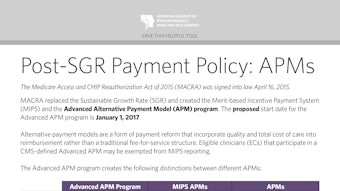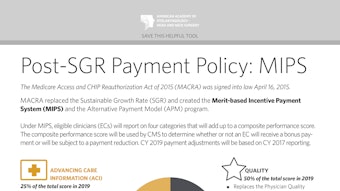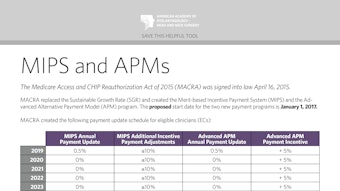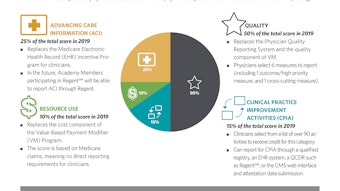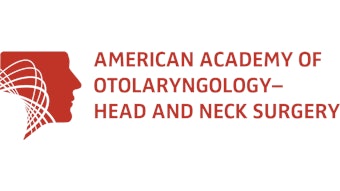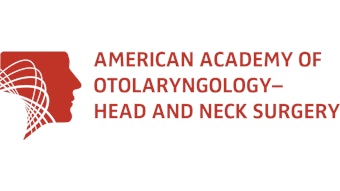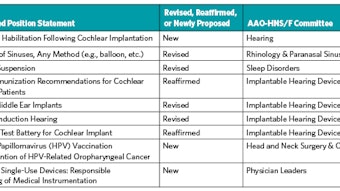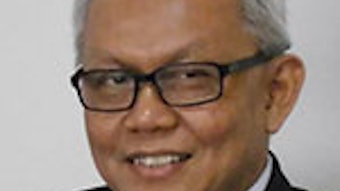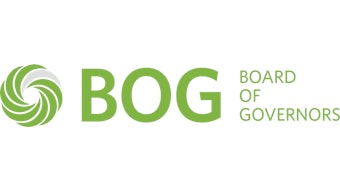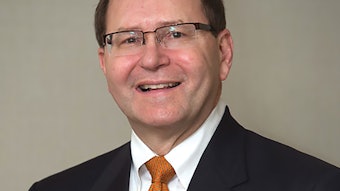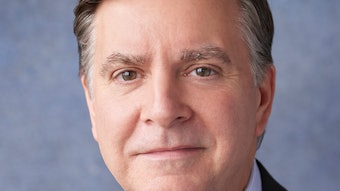Revamping hearing health in Barbados
Here in the United States, universal newborn hearing screening has become so prevalent and successful that we nearly take it for granted that children with hearing loss will be identified and treated. For the few children who slip through the cracks, the consequences are substantial and the feelings of failure are real.
Daniel H Coelho, MD, Department of Otolaryngology-Head & Neck Surgery, Virginia Commonwealth University, Richmond, Virginia
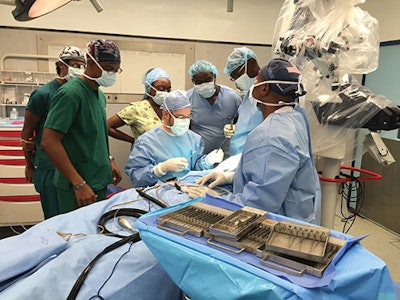 A team of surgeons from Virginia Commonwealth University performed the first cochlear implant in Barbados in May.
A team of surgeons from Virginia Commonwealth University performed the first cochlear implant in Barbados in May.
With this in mind, the small but highly dedicated group from Barbados-based Sandy Lane Charitable Trust (SLCT) reached out to the World Pediatric Project (WPP) to inquire if help was available. In fact, SLCT had long recognized the impact of hearing loss on their country and has even funded several children to come the United States for cochlear implantation. However, the cost of implantation along with the ongoing costs of programming, coupled with the associated travel expenses, were beginning to take a toll on even this relatively well-financed charity.
In October of 2015, audiologist Sean Kastetter, CCC-A, Virginia Commonwealth University (VCU) and I flew to Barbados to determine what resources (both surgical and audiologic) were available to proceed with cochlear implantation and programming. What quickly became evident was that the entire infrastructure for the testing and treating of children with hearing loss was in serious need of an overhaul. Moreover, cochlear implantation surgery in the absence of a greater mission of pediatric hearing health could not, and probably should not, be done.
Thus began a seven-month intensive collaboration between VCU, SLCT, WPP, The Barbadian Ministry of Health, The Queen Elizabeth Hospital in Bridgetown, Barbados, Barbadian otolaryngologists (notably Chris Maynard, MD, and Roy Forde, MD), audiologists, speech therapists, nurses, Phonak, Cochlear, and many others.
After hundreds of phone calls and thousands of emails, the groundwork was laid to completely revamp the hearing health program for this country of 500,000. This culminated in a return visit by the VCU team, this time also including audiologist Jennifer White, CCC-A, and audiologic instrument calibration expert Jim Kimmel, to Barbados in May 2016.. The team performed repair and recalibration of equipment, brought in new equipment, treated patients, and had multiple collaborative team meetings. Thanks to the newly established SLCT hearing aid bank, many children with moderate to severe hearing loss were fitted with their first hearing aids. Most of these children had been waiting in excess of two years due to lack of government or personal funds.
Eight (of nine) children from the island with cochlear implants (CIs) were seen, had member assistant program checks, and received assistance with parts and maintenance, which obviated the need to fly them and their families to the U.S. and Canada for programming sessions.
The crowning achievement of this visit was in fact the placement of a CI on 2-year old J’dae Prescott-Smith—the first CI surgery ever done in that country or the Eastern Caribbean. The procedure was a success as was the initial activation and subsequent adjustments over the next two days. In addition to a busy press conference, J’dae’s surgery was covered on the front page of all the major newspapers on the island as well as the morning television shows. The excitement generated over the CI served very well to highlight the bigger picture of pediatric hearing health on the island. Monthly teleprogramming sessions (via Skype with local audiologist Jan Wickham) have been going well, and the patient is making wonderful progress.
Performing a cochlear implantation prior to the existence of a well-established hearing screening program may seem like putting the cart before the horse. However, in this case a CI served as a spark that highlighted the possibilities of what can be done when basic pediatric audiologic services exist and are appropriately utilized. With a shared and ongoing commitment by the VCU team, WPP, and SLCT to return to Barbados numerous times per year, the groundwork has been set for the establishment of a quality pediatric hearing health program. There is still much work to be done, but the amount accomplished over the past year is a testament to what can be done when the right people come together at the right time for the right reasons.
